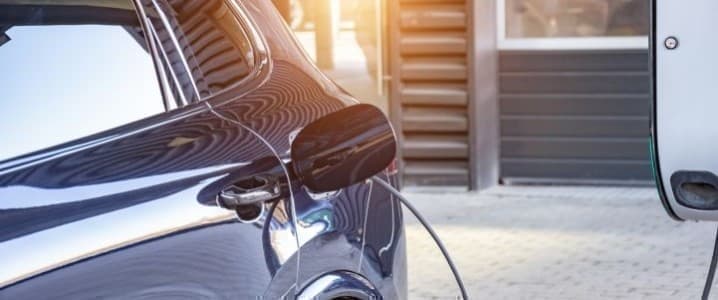Last year, the electric vehicle sector crossed a global milestone, with one out of ten vehicles sold being electric for the first time ever. While that slice of the market might not seem like much in the grand scheme of things, another alarming trend for legacy ICE vehicle makers like Ford Motor Co., Mercedes-Benz Group AG and BMW is that their total vehicle sales declined despite EV sales more than doubling. And now Big Oil has read the writing on the wall, and is making the necessary adjustments to face the new reality. To wit, giant oil and gas companies are investing heavily in EV charging stations and ditching their sprawling gas station empires. On Thursday, TotalEnergies SE (NYSE:TTE) announced that it was selling nearly 2,000 gas stations in Europe to Canadian convenience-store company Alimentation Couche-Tard (TSX:ATD:CA) (OTCPK:ANCTF) for €3.1 billion ($3.3 billion). The French mineral oil company revealed that it plans to sell its entire service station network in Germany and the Netherlands to Couche-Tard mainly due to the planned phasing out of internal combustion engines in Europe. Total also said that it will focus on hydrogen and charging stations in countries where the company is not the market leader.
Last month, British multinational BP Plc (NYSE:BP) agreed to acquire the operator of travel centers and truck service facilities, TravelCenters of America (NASDAQ:TA), in a deal valued at ~$1.3B. With 280 locations on U.S. highways, the acquisition will complement BP’s existing convenience and mobility business and also help expand its growing electric vehicle charging, biofuels, renewable natural gas (RNG) and hydrogen businesses.
Related: Vitol Revenue Skyrocketed 80% In 2022
But it’s Europe’s largest energy company that appears to have made the most progress in the EV chargepoint rollout. Two years ago, Shell Plc. (NYSE:SHEL) laid out a grand plan of how it will survive in a zero-emission, climate conscious world. The plan rests on five main pillars that include, among other things, a massive rollout of electric vehicle charging stations and the development of a significantly larger renewable energy generation portfolio. Today, Shell operates a global network of 140,000 EV charge points, a number that dwarfs its 46,000 gas stations worldwide. Shell has a target to have 500,000 charge points by 2025 in locations such as gas stations, homes and grocery store car parks.
Clean Energy Investments
Under mounting pressure from Europe’s no-nonsense climate activists, European oil and gas giants have begun doubling down on their clean energy investments.
Last month, BP unveiled plans to spend $1B by 2030 on electric vehicle charge points across the U.S.
BP, which considers car rental company Hertz Global Holdings Inc. (NASDAQ:HZE) a "cornerstone" of its EV investment in the U.S., has announced plans to build EV charging infrastructure at Hertz locations in at least a dozen major U.S. cities. BP says that some of the fast-charging installations will include gigahubs locations, essentially large-scale fast charging hubs for car rental customers, rideshare and taxi drivers, and the general public at locations such as airports. BP already has 22K EV charge points worldwide and aims to have more than 100K globally by 2030.
Earlier this month, BP and Spanish electric utility company Iberdrola S.A. (OTCPK:IBDRY) launched a joint venture that will spend ~€1B by 2030 to build a network of fast and ultra-fast EV charging points in Spain and Portugal.
But BP is also investing heavily in other green businesses. Last month, the company announced that it intends to spend as much as €2B (~$2.12B) by 2030 at its Castellón refinery in Spain in a phased development of a green hydrogen plant of up to 2 GW of electrolysis capacity. BP aims to have its first hydrogen electrolyzer unit of 200 MW operational by 2027 with the unit producing 31.2K metric tons/year of green hydrogen.
Although investing in charge points and other clean energy infrastructure eliminates a significant degree of commodity and volatility risk, it comes with a price: margins at the convenience and EV-charging business are lower than in oil and gas exploration at 15% vs. 20%.
But Europe’s oil and gas supermajors are increasingly having little choice in the matter: last week, two of the U.K.'s largest pension funds threatened to vote against the renewal of top directors at BP and Shell unless both companies strengthen their commitments to tackling carbon emissions. The plan by Universities Superannuation Scheme and Borders to Coast is part of efforts to push oil companies and banks to accelerate delivery on their climate pledges. The two funds together oversee £130B (~$156.3B) in assets.
By Alex Kimani for Oilprice.com
More Top Reads From Oilprice.com:
- King Of Saudi Arabia Invites Iranian President For Historic Visit
- UK Considers Easing Windfall Tax Pressure On Oil And Gas
- A North Sea Hydrogen Pipeline Network Is Possible


















